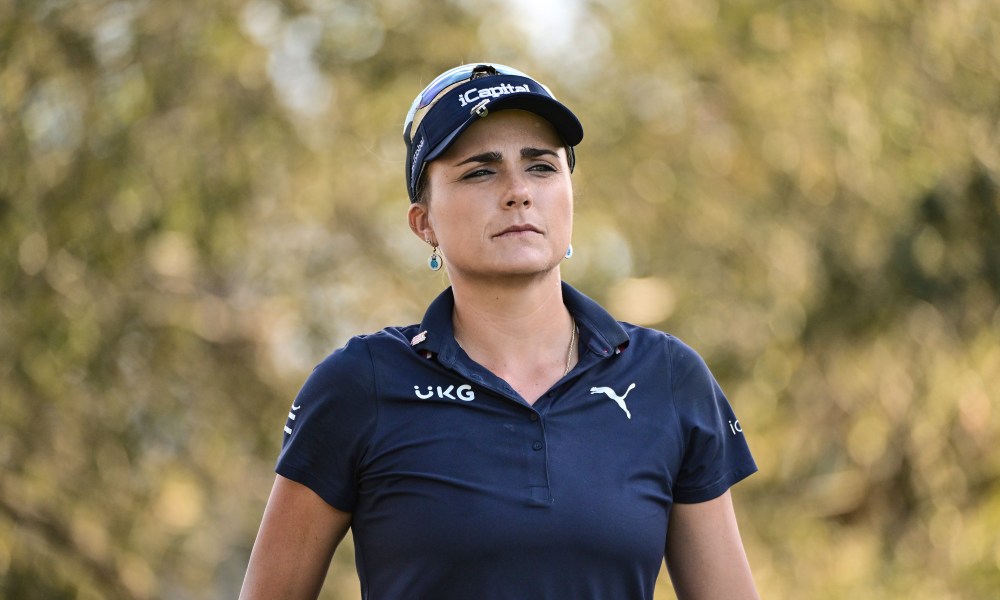Lexi Thompson told herself she wasn’t going to cry. But her voice cracked right as she began to talk about the loneliness of tour life. Not that she wants a pity party, by any means. But as the 29-year-old talked about the decision to retire from full-time golf at the end of the 2024 season, she wanted to reiterate the human element of the game. Words hurt. And she was proud to have overcome some brutally tough moments.
“I just think, especially with what’s happened in golf, as of recent too,” she said, “a lot of people don’t — they don’t realize a lot of what we go through as a professional athlete. … I might not have a huge friend group, but to have the people that matter the most around me has gotten me through some really hard times.”
Thompson’s retirement announcement came on Tuesday at the 79th U.S. Women’s Open at Lancaster Country Club, where Thompson will make her 18th start in the championship. Her history with the Women’s Open began in 2007 at Pine Needles, when the prodigious 12-year-old became the youngest to ever compete. Though she’s never won the U.S. Women’s Open, this is where it all started, and she found it a fitting place to break the news.
“I feel like I’m very content with where my life is and where this decision will lead me to,” said Thompson. “I’m just looking forward to what life has in store other than golf.”
Thompson won her first LPGA title at age 16, setting a record that was later broken by a 15-year-old Lydia Ko. Her 11 wins on the LPGA include the 2014 Chevron Championship, her only major. Her last victory on the LPGA came at the 2019 Shoprite LPGA Classic.
Though she had battled a hand injury for some time, she downplayed it on Tuesday, noting that she’s now able to swing without any pain and has plenty of goals left for this season, which no doubt include a seventh U.S. Solheim Cup team appearance.
As for what’s next, Thompson didn’t rule out playing in more LPGA events beyond this year, saying she’ll take it day by day. She hopes to launch a fitness app soon and one day start a family.
“Golf has been my life ever since I was 5 years old, tournaments when I was 7,” she said. “I haven’t really known much of a life different, but it’s been an amazing one.”
While there have been plenty of high points over the course of her 13 seasons on tour, Thompson’s heartache has been particularly piercing, most notably the 2017 ANA Inspiration when she was informed of a four-stroke penalty while on the back nine Sunday for improperly replacing her ball earlier in the week and then signing an incorrect scorecard. Thompson, who was leading the tournament at the time, eventually lost in a playoff to So Yeon Ryu, but the crowd at Mission Hills Country Club was quite loudly on her side.
Lexi Thompson
Lexi Thompson plays her shot from the fifth tee during the final round of the U.S. Women’s Open golf tournament at The Olympic Club. Mandatory Credit: Kelvin Kuo-USA TODAY Sports
There have been heartbreaks at other majors, too. Falling apart down the stretch at The Olympic Club at the USWO three years ago when she had a five-stroke lead was particularly brutal, and then another close call came in 2022 at Congressional at the KPMG Women’s PGA where, playing in the last group, she squandered a two-stroke lead with three holes to play and was promptly hit with a slow-play fine.
But the loss seven years ago at Mission Hills, her favorite tour stop, was undoubtedly the toughest. Fans chanted Thompson’s name down the stretch and through tears, she stayed to sign autographs for all the young fans who wanted to be just like her. The USGA ultimately changed the Rules of Golf after that four-stroke fiasco, but the damage had been done, and the accusations of cheating cut deep.
Thompson took a break from social media from time to time to cut out the noise. Amy Olson, a veteran player who announced who own retirement earlier this season, noted several years ago that Thompson endured more than most in her comment sections.
“I looked at the comments that have been on Lexi’s posts,” Olson once said. “It’s horrible. She can’t post anything. If she posts her putting, it’s ‘You should be working on your swing.’ If she’s in the gym, ‘You should be practicing.’ If she’s on the beach, ‘You should play more.’ There’s always something to criticize.”
Thompson now views the 2017 loss at ANA as both the hardest moment of her career and the biggest blessing. She looks back on it now as a moment of growth and a chance to gain new fans. It still hurts enough to elicit tears even now, but there was still a hint of peace about what transpired. She can at least see some good in it now.
It’s hard to imagine that anyone on tour has bounced back from more than Thompson. Just last season, after missing eight cuts in 11 starts, she flipped a switch in time for the Solheim Cup in Spain and went on to hold her own at a PGA Tour event in Vegas.
“I think we all have our own struggles, especially out here,” said Thompson, when asked how much mental health played a role in her decision.
“Unfortunately in golf, you lose more than you win, so it’s an ongoing battle to continue to put yourself out there in front of the cameras and continuing to work hard and maybe not seeing the results you want and getting criticized for it. So it’s hard.
“I will say, yes, I’ve struggled with it. I don’t think there’s somebody out here that hasn’t. It’s just a matter of how well you hide it, which is very sad.”
Alexa Pano, 19, first played with Thompson when she was 5 years old and still has an autographed photograph of her on display in the living room.
“She’s a big inspiration,” said Pano, a fellow prodigy now in her second full year on tour, after wrapping up a range session at Lancaster. “We were all talking about her at breakfast this morning.”
While Nelly Korda is in the midst of an historic run this season, it was Thompson who was the face of American golf for a decade before her, and more than did her part when it came to fans and sponsors.
Stacy Lewis looks back on when Thompson came onto the scene and – when the tour was at its lowest point – and believes she’s a major reason the tour is where it is today. Thompson was the star power the tour needed, and her powerful, athletic play, ushered in a new era. Couple that with all that Thompson did behind the scenes, and she was a major force.



